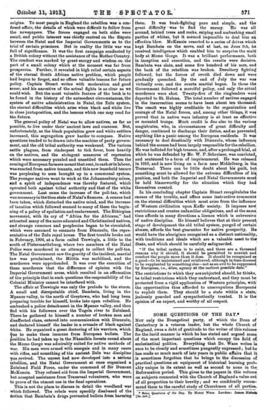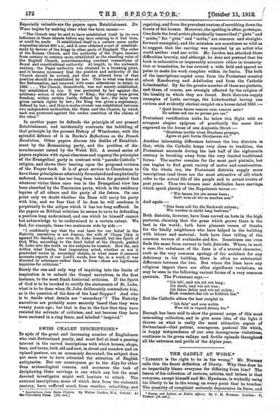SOME QUESTIONS OF THE DAY.*
NOT only the Evangelical party, of which the Dean of Canterbury is a veteran leader, but the whole Church of England, owes a debt of gratitude to the writer of this volume for the lucid manner in which he has stated and argued some of the most important questions which occupy the field of. ecclesiastical politics. Everything that Dr. Wace writes is sure to be clearly and sometimes pungently expressed; but he has made so much mark of late years in public affairs that it .18 sometimes forgotten that be brings to the discussion of practical questions art equipment of historical learning prob-. ably unique in its extent as well as second to none in the Reformation period. This gives to the papers in this volume on subjects connected with the Church of England a value out, of all proportion to their brevity ; and we confidently recom- mend them to the careful study of Churchmen of all parties.
* SOiriO Question') of the Day. 'By Henry Wave. London: Jame' Nisbet. Ps. net.]
Especially valuable are the papers upon Establishment. Dr. Wace begins by making clear what the term means :- " The Church may be said to have established itself by its own influence in these islands before any laws relating to it had been, or could be, made. It established itself in a certain sense under
Augustine about 600 A.D., and it soon obtained a sort of establish- ment by favour of the kings in other parts of England. The order
of the Roman Church, and the authority of the Popes, became from century to century more established as the standing rules of the English Church, notwithstanding constant reassertions of
Royal and constitutional authority. At length, in the sixteenth century, the Papal authority was strained to a breaking point, and it became necessary that the position and authority of the Church should be revised, and that an altered form of that position should be established by law. This is what was done at the Reformation, and renewed, with some alterations in detail, in 1662. . . . The Church, thenceforth, was not merely established, but established by law. It was protected by law against the arbitrary action of either Pope or King; the clergy were given freedom, within certain limits, defined by law ; the laity were given certain rights by law ; the King was given a supremacy, defined by law; and thus a modus Divendi was established between two independent authorities, the State and the Church, by which each was protected against the undue assertion of the claims of the other."
In another paper he defends the principle of our present
Establishment, and incidentally contrasts the belittling of that principle by the present Bishop of Winchester, with the
splendid defence of it in Burke's Reflections on the French Revolution. Other papers discuss the dislike of Establish-
ment by the Romanizing party, and the problem of dis- memberment raised by the Welsh Bill. A second series of papers explains with equal clearness and cogency the principles of the Evangelical party in contrast with " pseudo-Catholic " religion, and shows their bearing upon the proposed revision of the Prayer-book. It is of great service to Churchmen to
have these principles so admirably formulated and emphatically enforced, because it has too long been taken for granted that whatever virtue there once was in the Evangelical view has been absorbed by the Tractarian party, which is the residuary legatee of all others and the party of the future. On one point only we doubt whether the Dean will carry his party with him, and we fear that if he does he will condemn it perpetually to the eclipse which it has too long suffered. In the papers on Biblical criticism he seems to us to be defending a position long undermined, and one which lie himself cannot
but acknowledge to be undermined to a certain extent. We find, for example, these two sentences side by side :- "I confidently say that the real basis for our belief in the Nativity narratives is not Joanna, the wife of Chuza [this is against Dr. Sanday], nor even St. Luke himself, but the Spirit of God, Who, according to the fixed belief of the Church, guided St. Luke into the truth on the subjects he treated. How far, and within what limits, that inspiration acted, whether or not it precluded errors in secondary details, in what sense it ensured accurate reports of our Lord's words, how far, in a word, it was directed to substance rather than to form—these are legitimate inquiries for criticism."
Surely the one and only way of inquiring into the limits of inspiration is to submit the Gospel narratives, in the first instance, to the most frank historical criticism. If the Spirit
of God is to be invoked to certify the statements of St. Luke, what is to be done when St. John deliberately contradicts him, as in the question of the date of the Last Supper ? And who is to decide what details are " secondary " ? The Nativity narratives are probably more securely based than they were twenty years ago; but that is due to the fact that they have resisted the solvents of criticism, and not because they have been enclosed in a ring fence, and labelled " inspired."















































 Previous page
Previous page